2023年中考英语复习模块一语法专题探究第一章动词(含动词短语)课件(共58张PPT)
文档属性
| 名称 | 2023年中考英语复习模块一语法专题探究第一章动词(含动词短语)课件(共58张PPT) |  | |
| 格式 | pptx | ||
| 文件大小 | 780.9KB | ||
| 资源类型 | 教案 | ||
| 版本资源 | 人教新目标(Go for it)版 | ||
| 科目 | 英语 | ||
| 更新时间 | 2023-06-10 22:45:53 | ||
图片预览

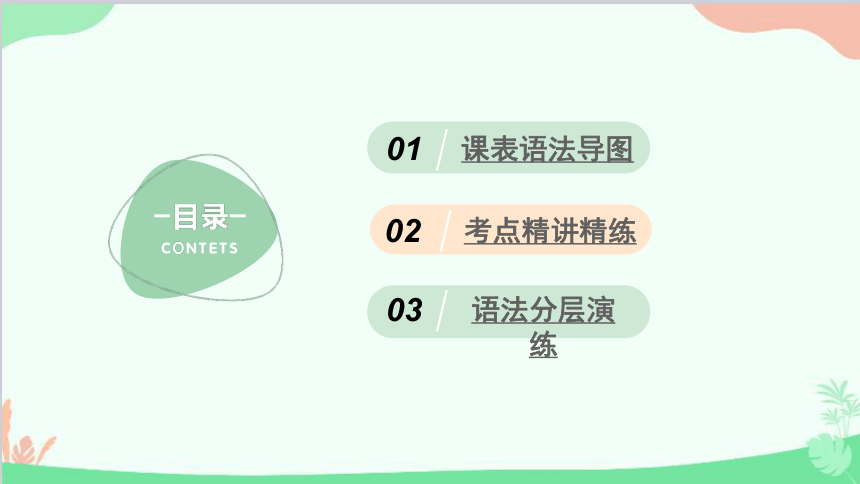
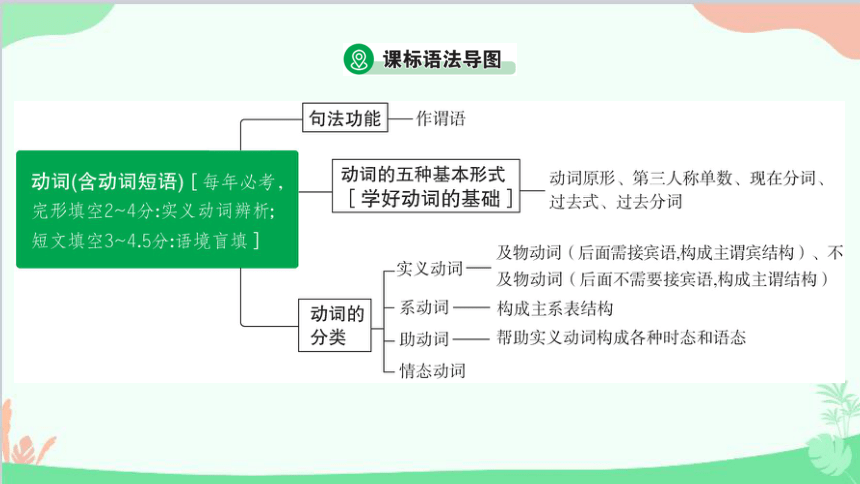
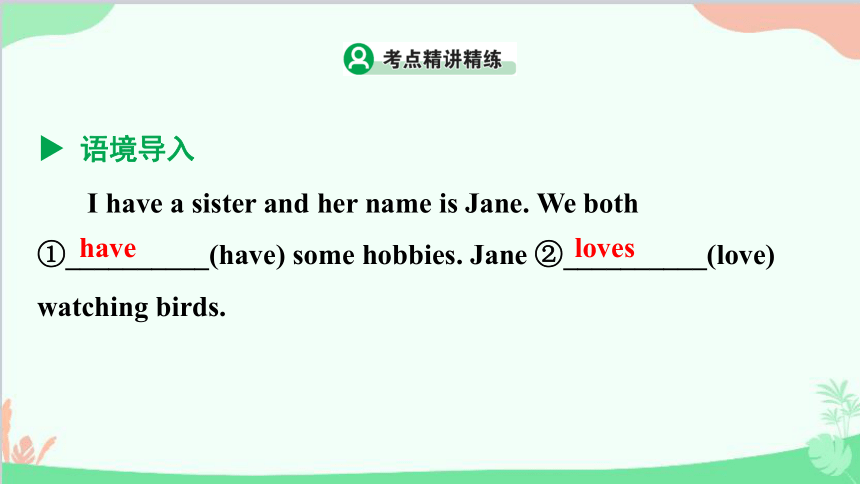
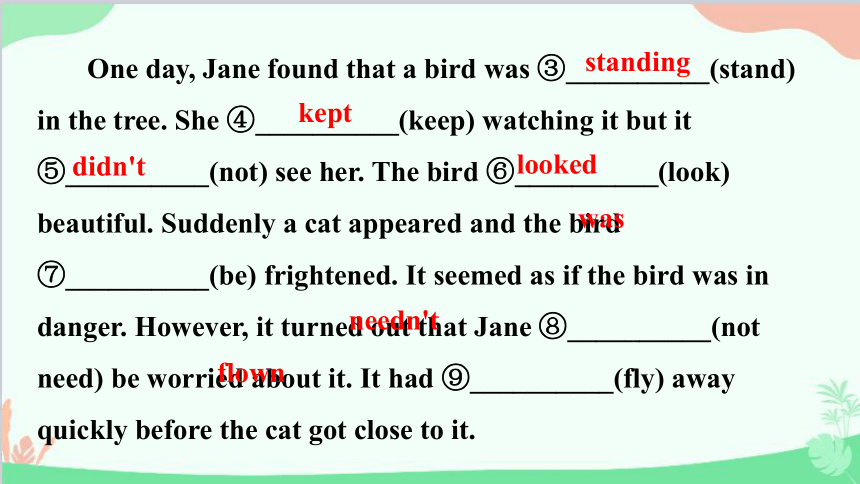
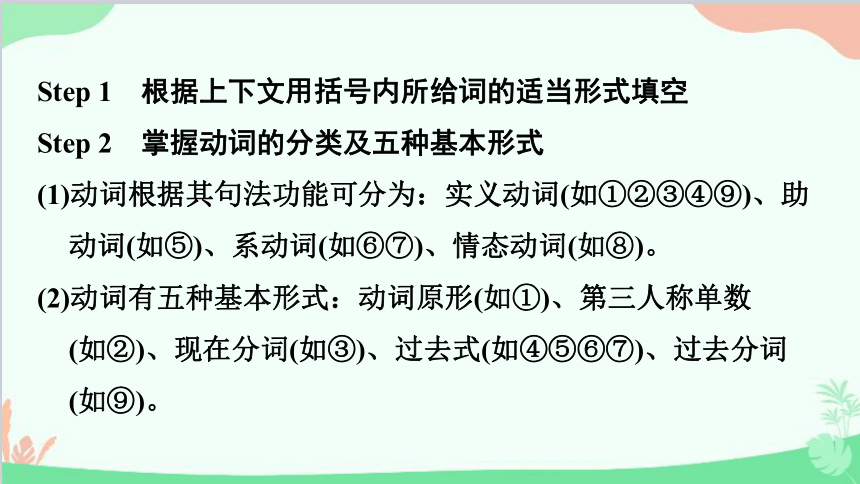
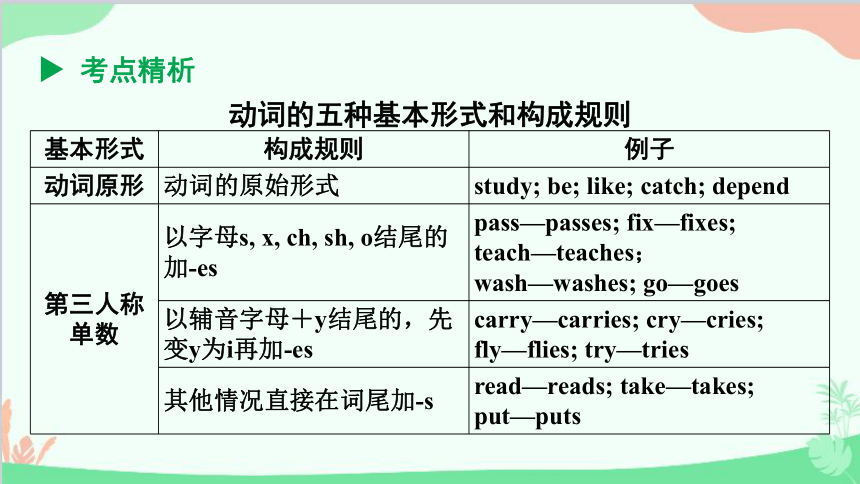
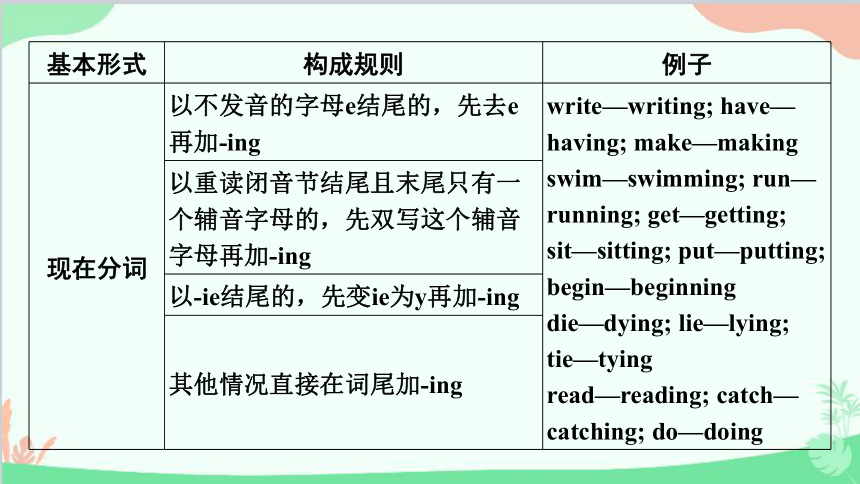
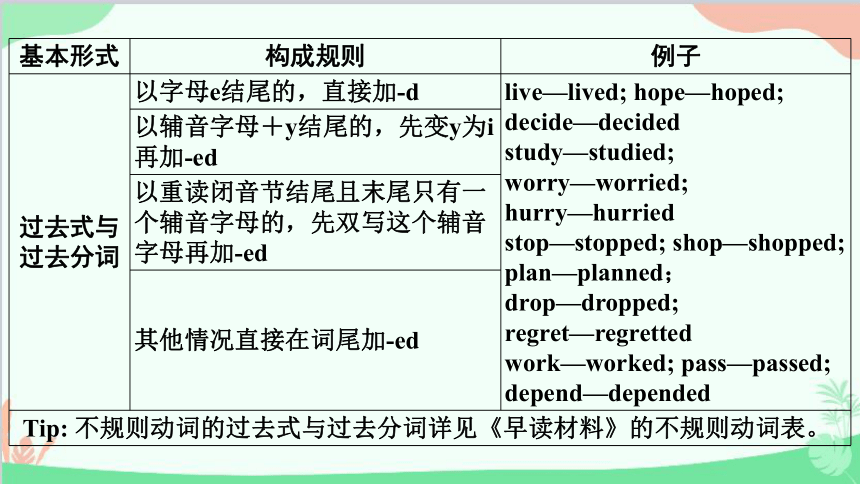
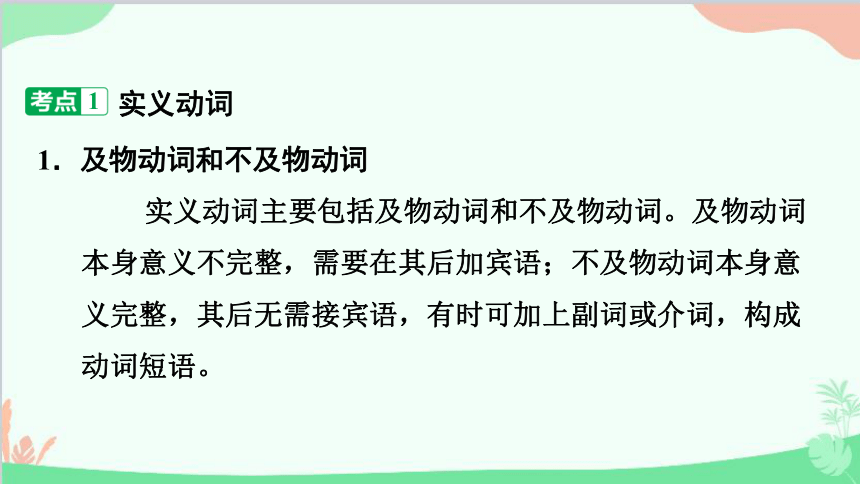
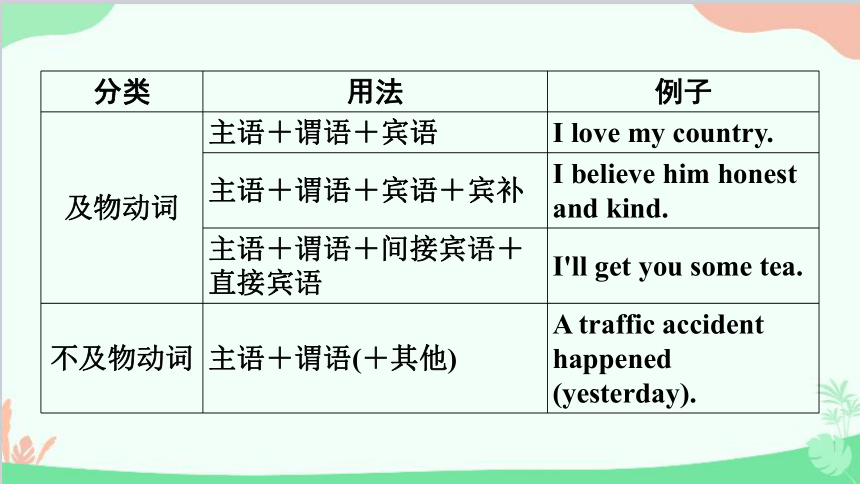
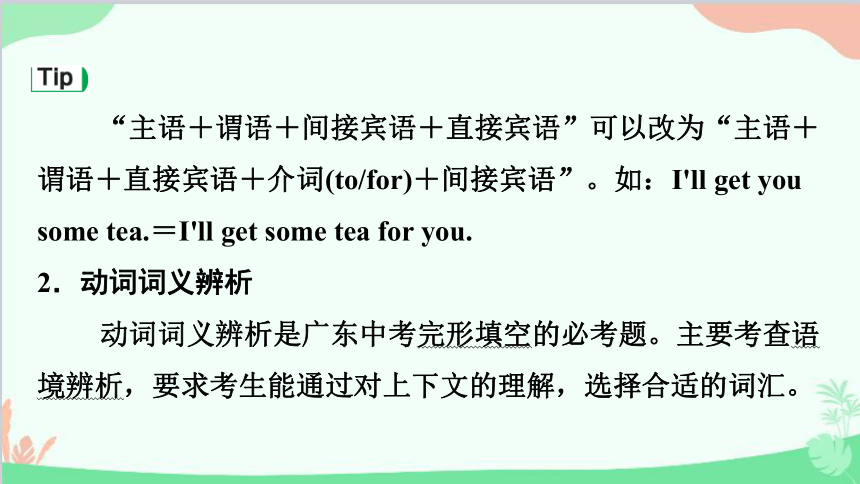
文档简介
(共58张PPT)
模块一 语法专题探究
第一章 动词(含动词短语)
01
课表语法导图
02
考点精讲精练
03
语法分层演练
语境导入
I have a sister and her name is Jane. We both ①__________(have) some hobbies. Jane ②__________(love) watching birds.
have
loves
One day, Jane found that a bird was ③__________(stand) in the tree. She ④__________(keep) watching it but it ⑤__________(not) see her. The bird ⑥__________(look) beautiful. Suddenly a cat appeared and the bird ⑦__________(be) frightened. It seemed as if the bird was in danger. However, it turned out that Jane ⑧__________(not need) be worried about it. It had ⑨__________(fly) away quickly before the cat got close to it.
standing
kept
didn't
looked
was
needn't
flown
Step 1 根据上下文用括号内所给词的适当形式填空
Step 2 掌握动词的分类及五种基本形式
(1)动词根据其句法功能可分为:实义动词(如①②③④⑨)、助动词(如⑤)、系动词(如⑥⑦)、情态动词(如⑧)。
(2)动词有五种基本形式:动词原形(如①)、第三人称单数
(如②)、现在分词(如③)、过去式(如④⑤⑥⑦)、过去分词(如⑨)。
考点精析
动词的五种基本形式和构成规则
基本形式 构成规则 例子
动词原形 动词的原始形式 study; be; like; catch; depend
第三人称 单数 以字母s, x, ch, sh, o结尾的加 es pass—passes; fix—fixes; teach—teaches;
wash—washes; go—goes
以辅音字母+y结尾的,先变y为i再加 es carry—carries; cry—cries;
fly—flies; try—tries
其他情况直接在词尾加 s read—reads; take—takes;
put—puts
基本形式 构成规则 例子
现在分词 以不发音的字母e结尾的,先去e再加 ing write—writing; have—having; make—making
swim—swimming; run—running; get—getting;
sit—sitting; put—putting; begin—beginning
die—dying; lie—lying; tie—tying
read—reading; catch—catching; do—doing
以重读闭音节结尾且末尾只有一个辅音字母的,先双写这个辅音字母再加 ing
以 ie结尾的,先变ie为y再加 ing
其他情况直接在词尾加 ing
基本形式 构成规则 例子
过去式与 过去分词 以字母e结尾的,直接加 d live—lived; hope—hoped; decide—decided
study—studied;
worry—worried;
hurry—hurried
stop—stopped; shop—shopped; plan—planned;
drop—dropped;
regret—regretted
work—worked; pass—passed; depend—depended
以辅音字母+y结尾的,先变y为i再加 ed
以重读闭音节结尾且末尾只有一个辅音字母的,先双写这个辅音字母再加 ed
其他情况直接在词尾加 ed
Tip: 不规则动词的过去式与过去分词详见《早读材料》的不规则动词表。
1
实义动词
1.及物动词和不及物动词
实义动词主要包括及物动词和不及物动词。及物动词本身意义不完整,需要在其后加宾语;不及物动词本身意义完整,其后无需接宾语,有时可加上副词或介词,构成动词短语。
分类 用法 例子
及物动词 主语+谓语+宾语 I love my country.
主语+谓语+宾语+宾补 I believe him honest and kind.
主语+谓语+间接宾语+直接宾语 I'll get you some tea.
不及物动词 主语+谓语(+其他) A traffic accident happened (yesterday).
“主语+谓语+间接宾语+直接宾语”可以改为“主语+谓语+直接宾语+介词(to/for)+间接宾语”。如:I'll get you some tea.=I'll get some tea for you.
2.动词词义辨析
动词词义辨析是广东中考完形填空的必考题。主要考查语境辨析,要求考生能通过对上下文的理解,选择合适的词汇。
考点1分层专练
先练基础——单句训练
( )1.(2022天津)My aunt offered me a dictionary and I ________ it happily.
A.accepted B.invited
C.mixed D.grew
A
( )2.(2022泰州)Schools should ________ students to form good working habits through labor education.
A.force B.Encourage
C.warn D.promise
B
( )3.(2022贵港)—The air pollution in our city is becoming worse and worse.
—That's right.But the government is trying to ________ this problem.
A.solve B.plan
C.answer D.discover
A
4.Tony Brown usually __________ a bike to school with his brother.
5.Don't __________ him up so early.He stayed up late studying last night.
6.Look! The girl who __________ a red dress is my sister Linda.Red is her favorite color.
rides
wake
wears
再提能力——小语篇训练(完形填空)
Long long ago, there were no donkeys(驴) in an ancient Chinese place named Qian, so a man brought a donkey to Qian by boat.However, he found the donkey useless there, so he set it free in the hill.
Soon after, a tiger saw the strange animal.He hid behind trees to __7__ it carefully.Suddenly he __8__ a most terrible noise, “Heehaw!Heehaw!” He was so afraid that he ran back to his house and hid.
( )7.A.study B.eat C.love D.get
( )8.A.saw B.told C.heard D.felt
A
C
Later, the tiger felt great shame.“I'm a tiger! I should not be afraid of any animal!” So he went back.When the donkey saw the tiger behind it, it began to __9__ hard with its back legs and hurt the tiger badly.But the tiger __10__ the noisy animal only kicked behind.So the tiger jumped on it from the side and ate the donkey.This story tells us that we sometimes need more than one skill to win.
( )9.A.train B.push C.pull D.kick
( )10.A.forgot B.noticed
C.imagined D.remembered
D
B
2
系动词和助动词
1.系动词
系动词表示主语“是什么”或“怎么样”,后面通常接名词或形容词。常见的系动词有:
(1)五感:look(看起来), smell(闻起来), taste(尝起来), sound(听起来), feel(觉得)
The dish smells good and tastes delicious.
这道菜闻起来很好,尝起来很美味。
(2)五变
①become: 最普通用词,从一种状态变成另一种状态。如:
He became angry with his son. 他生他儿子的气了。
②get: 多用于口语,从一种状态变成另一种状态,become较正式。
③turn: 侧重与原来截然不同,后多接表示颜色的形容词,也可以接表示天气的形容词。如:His face turned red.他的脸变红了。
④grow: 侧重于“逐渐变成某种状态”,其后可以接表示人或物的特征的静态形容词,也可以接表示天气的形容词。如:The sky grew dark.天变黑了。
⑤go: 侧重于“(从好的状态)变成坏的状态”。如:
In hot weather, meat goes bad easily.在热天,肉容易变坏。
(2)五变
①become: 最普通用词,从一种状态变成另一种状态。如:
He became angry with his son. 他生他儿子的气了。
②get: 多用于口语,从一种状态变成另一种状态,become较正式。
③turn: 侧重与原来截然不同,后多接表示颜色的形容词,也可以接表示天气的形容词。如:His face turned red.他的脸变红了。
④grow: 侧重于“逐渐变成某种状态”,其后可以接表示人或物的特征的静态形容词,也可以接表示天气的形容词。如:The sky grew dark.天变黑了。
⑤go: 侧重于“(从好的状态)变成坏的状态”。如:
In hot weather, meat goes bad easily.在热天,肉容易变坏。
(3)三保持:keep(保持), stay(保持), remain(仍然是)
We should keep our classroom clean.我们应当保持教室干净。
(4)二特殊:be动词, seem(似乎)
He seems a nice man.他似乎是个好人。
2.助动词
助动词本身没有实际意义,不能独立作谓语,必须和实义动词一起用,在句中帮助提问、否定以及构成相应的时态和语态。常用的助动词有:be(is, am, are, was, were, isn't, am not, aren't, wasn't, weren't), do(do, does, did, don't, doesn't, didn't), will(will, won't, would, wouldn't)和have(have, has, had, haven't, hasn't, hadn't)等。如:
I will be a high school student next year.
我明年就要成为一名高中生了。
( )1. 易错点(2022无锡)—Dad, what's for dinner It ________ nice!
—I'm cooking chicken soup.
A.tastes B.smells C.looks D.feels
考点2专练
B
( )2.(2022辽阳)The soup ________ a little salty.There is no need to add more salt.
A.looks B.smells C.sounds D.tastes
D
3.(2022北京)Jim __________ learned a lot about Chinese culture since he began to study in our school.
4.China Panda Train from Chengdu to Zunyi __________ put to use on March 28, 2021.
has
was
3
情态动词
情态动词表示说话人的情感与态度,不能单独作谓语,只能和实义动词原形一起构成谓语。
1.常用情态动词
情态动词 用法 例子
can/ could (1)表能力,意为“能;会”,can用于一般现在时,could用于一般过去时 (2)表请求或许可,意为“可以”,在疑问句中,could比can语气更委婉,回答时用“主语+can或can't/cannot” ①My friend can speak five languages.我朋友会说五种语言。
②—Could/Can I ask you a question
我能问你一个问题吗?
—Of course you can.
当然可以。
情态动词 用法 例子
may/ might (1)表请求或许可,意为“可以”,比can正式,语气更加委婉;否定回答多用mustn't/can't表示不可以 (2)表祝愿、希望、祈求等 ①—May I park my car here for a while?
我可以把车停这儿一会儿吗?
—No, you mustn't/can't.
不,你不能。
②May you have a good time.
祝你过得愉快。
shall shall用于第一人称疑问句,表征询意见、建议或请求指示 Shall we go to the cinema?
我们去看电影怎么样?
should should表建议、义务等,意为“应该” You should read his new book.
你应该读读他的新书。
情态动词 用法 例子
must/ have to (1)must意为“必须”,强调说话人的主观看法。对其一般疑问句的肯定回答用must, 否定回答用needn't或don't have to (2)have to意为“不得不;必须”,强调客观需求,有人称、时态和数的变化 ①You must arrive here before 10 o'clock tomorrow.你必须明天十点之前到这里。
②I missed the last bus, so I had to walk home.
我错过了最后一班公交车,所以我不得不走回家了。
情态动词 用法 例子
need 意为“需要”,作情态动词时常用于否定句和疑问句中。对其一般疑问句的肯定回答用must或have to, 否定回答用needn't You needn't come tomorrow.明天你不需要来。
had better 表劝告、建议,意为“最好”,固定搭配had better (not) do sth.最好(不)做某事 You'd better not swim in the river.It's very dangerous.
你最好不要在河里游泳。那很危险。
Tip: 情态动词变否定时,在其后加not;变疑问句时,将其提到句首。
2.情态动词表推测
情态动词 用法 例子
may/ might (1)表示不确定,may可能性大于might (2)may/might not意为“可能不” ①He may/might know the way to the post office.I am not sure.他可能知道去邮局的路。我不确定。
②There are many stars in the sky.It may/might not rain tomorrow.天上有很多星星。明天可能不会下雨。
情态动词 用法 例子
can/ could (1)could比can表示的可能性要小 (2)can表推测时用于疑问句 (3)can't意为“不可能” ①Who can it be?It's so late.
会是谁呢?都这么晚了。
②The boy under the tree can't be John.He went to London with his parents yesterday.
树下的那个男孩不可能是约翰。他昨天和父母去伦敦了。
must 用于肯定句,表示非常有把握的推测,意为“一定;肯定” The notebook must be Li Ming's.His name is on the first page.这个笔记本一定是李明的。他的名字在第一页。
Tip: 表推测的可能性大小为:must>can(疑问句)>could>may>might>can't
( )1.(2022辽宁)—I can't find my dictionary.________ I use yours
—Sure, here you are.
A.Need B.Must C.May D.Should
考点3专练
C
( )2.(2022毕节)Students ________ play with fire in the classroom.It's quite dangerous.
A.must B.mustn't
C.could D.couldn't
B
( )3.(2022荆州)—Mike, I can't stop playing computer games.
—For your eyes, my dear friend, I'm afraid you ________.
A.could B.may C.would D.have to
D
( )4.(2022辽阳)—The paper cutting is pretty lively.Who made it
—It ________ be Amy.None of us except her is able to do it.
A.would B.need C.must D.can
C
( )5.(2022百色)—________ you tell us a story in English
—I think I can do it.Let me try.
A.Need B.Can C.Should D.Must
B
( )6. 易错点(2022朝阳)—Dad, must I become a doctor like you when I finish university in the future
—No, you ________.You can make your own decision and do whatever you like.
A.don't have to B.can't
C.mustn't D.couldn't
A
4
动词短语
动词短语在完形填空是必考的,在短文填空中也是常考点,需要考生在平时的学习中积累,具体内容见本书模块四“动词短语特训”。
层级一 语法点针对训练(本部分为对应的语法点语篇专练)
一、完形填空
It was a summer day.An old man was taking a walk down a hill.He wiped the sweat(擦汗) from his face and started __1__ a song.
( )1.A.playing B.singing
C.writing D.hearing
B
Suddenly, he heard a voice, “Hello, sir.” The old man __2__, but he saw no one.“I'm here,” the voice came from beside his feet.The old man __3__ and saw a beautiful flower.
( )2.A.turned off B.turned around
C.turned down D.turned up
( )3.A.looked around B.looked back
C.looked up D.looked down
B
D
“Sir, would you mind answering a question?” __4__ the flower.“Certainly not, my child.What do you want to know?” said the old man.The flower hesitated(犹豫) for a second and said, “Why are you so happy You are not young and maybe you don't have many days __5__.” The flower went on, “My days have __6__ and I'm going to wither(枯萎).That makes me so sad.”
( )4.A.repeated B.replied C.asked D.refused
( )5.A.found B.left C.got D.paid
( )6.A.returned B.stood C.Passed D.achieved
C
B
C
The old man laughed, “Yes, I don't have many days left.But so what Why __7__ such a lovely day on something that hasn't happened?” The flower didn't quite __8__.The old man continued, “What's gone is gone.What's to come is to come.You can't __9__ it.But you can decide to enjoy this very moment that you truly have.”
( )7.A.enjoy B.remember C.take D.waste
( )8.A.imagine B.understand C.discover D.create
( )9.A.keep B.record C.hold D.change
D
B
D
And he didn't __10__ the flower to respond(回应).He just walked away, continuing with the happy song he had been singing.
( )10.A.wait for B.put away
C.drop by D.cut down
A
二、短文填空
(2022盘锦改编)During the Jin Dynasty(266-420), there was a child called Che Yin.He was smart and loved to read.He 1.__________ up in a poor family and couldn't afford lamp(灯) oil to study at night.
One night, he saw fireflies(萤火虫) outside his house and 2.__________ up with an idea.He caught some fireflies and 3.__________ them in a cloth bag and hung the bag up as a lamp.It was said that he 4.__________ all of his summer nights reading like this.
grew
came
put
spent
Another child named Sun Kang lived during the same period.He loved 5.__________ very much.One night during winter, Sun 6.__________ up all of his lamp oil, so he had to sleep.When he suddenly 7.__________ up at midnight, he noticed the thick snow reflecting the moonlight.His first thought was “Oh, I 8.__________ use the reflected light to read!” He soon 9.__________ out his books and read, even if it was very cold.
reading
used
woke
can
took
Both of the kids later became successful government officers.People 10.__________ touched by their hard working spirit.The Chinese idiom(成语) nangying yingxue was inspired(启发) by their stories.
were
(2022郴州改编)A passenger told an air hostess(空姐) that he needed a cup of water to take his medicine when the plane just took off.She told him that she would bring him the __1__ in ten minutes.
( )1.A.medicine B.water C.cup D.food
B
层级二 中考题型训练(本部分为完整的中考题型训练)
完形填空
1.根据前文“he needed a cup of water to take his medicine”可知,这位旅客需要一杯水服药。于是这名空姐说十分钟后把水拿给他。
Ten minutes later, when the passenger's ring for service sounded, the air hostess was so __2__ that she forgot to send him the water.As a result, the passenger didn't __3__ his medicine on time.
( )2.A.busy B.tired C.afraid D.bored
( )3.A.take B.put C.buy D.lend
A
A
3.take medicine吃药。因为旅客没有得到水,因此他没有准时服药。
Another ten minutes passed.The air hostess __4__ it and turned over to the passenger with a cup of water, but he refused it.
( )4.A.gave B.offered
C.remembered D.forgot
C
4.句意:空姐记起来了,并转身给这位旅客拿了一杯水,但他拒绝了。
In the following hours on the __5__, each time the air hostess passed by the passenger, she would ask him with a smile whether he needed help or not.But the passenger never __6__ her again.
( )5.A.train B.bus C.plane D.underground
( )6.A.made friends with B.paid attention to C.took care of D.made fun of
C
B
5.根据第一段“the plane just took off”可知,这个故事发生在飞机上。
6.make friends with与……交朋友;pay attention to注意;take care of照顾;make fun of取笑。
When he was going to __7__ the plane, the passenger asked the air hostess to hand him the passengers' booklet(小册子).She was very __8__.She was afraid that the passenger wouldn't write down good words, but with a smile she gave it to him.
( )7.A.get off B.get on C.get into D.get out
( )8.A.happy B.nervous C.relaxed D.excited
A
B
8.根据后句“She was afraid…”可知,她很紧张,害怕这位乘客写下不好的话。
Off the plane, the air hostess __9__ the booklet, and smiled happily, for the passenger wrote, “On the flight, you kept __10__ me whether I needed help or not for twelve times in all.How can I refuse your twelve sincere smiles?”
That's right! Who can refuse twelve sincere smiles from a person
( )9.A.opened B.closed C.lost D.stole
( )10.A.advising B.telling C.asking D.forcing
A
C
9.根据“smiled happily, for the passenger wrote”可知,这名空姐打开了乘客册子。
10.根据第四段“she would ask him with a smile…”可知,该乘客指的是空姐一直问他是否需要帮助。
短文大意:本文是一篇记叙文,讲述了一名空姐在工作失误后因积极、热情的工作态度得到了乘客的谅解。
自我评价表
Step 1 请将你已经掌握的内容划“√”;尚未掌握的内容,请再次重点复习!
□动词的五种基本形式 □实义动词 □助动词 □系动词 □情态动词 □动词短语
Step 2 请为自己的学习成果打分
(1)我能运用所学语法知识,完成中考动词相关的语法题。__________分/5分
(2)我对做好动词相关的中考题有信心。__________分/5分
谢谢大家!
模块一 语法专题探究
第一章 动词(含动词短语)
01
课表语法导图
02
考点精讲精练
03
语法分层演练
语境导入
I have a sister and her name is Jane. We both ①__________(have) some hobbies. Jane ②__________(love) watching birds.
have
loves
One day, Jane found that a bird was ③__________(stand) in the tree. She ④__________(keep) watching it but it ⑤__________(not) see her. The bird ⑥__________(look) beautiful. Suddenly a cat appeared and the bird ⑦__________(be) frightened. It seemed as if the bird was in danger. However, it turned out that Jane ⑧__________(not need) be worried about it. It had ⑨__________(fly) away quickly before the cat got close to it.
standing
kept
didn't
looked
was
needn't
flown
Step 1 根据上下文用括号内所给词的适当形式填空
Step 2 掌握动词的分类及五种基本形式
(1)动词根据其句法功能可分为:实义动词(如①②③④⑨)、助动词(如⑤)、系动词(如⑥⑦)、情态动词(如⑧)。
(2)动词有五种基本形式:动词原形(如①)、第三人称单数
(如②)、现在分词(如③)、过去式(如④⑤⑥⑦)、过去分词(如⑨)。
考点精析
动词的五种基本形式和构成规则
基本形式 构成规则 例子
动词原形 动词的原始形式 study; be; like; catch; depend
第三人称 单数 以字母s, x, ch, sh, o结尾的加 es pass—passes; fix—fixes; teach—teaches;
wash—washes; go—goes
以辅音字母+y结尾的,先变y为i再加 es carry—carries; cry—cries;
fly—flies; try—tries
其他情况直接在词尾加 s read—reads; take—takes;
put—puts
基本形式 构成规则 例子
现在分词 以不发音的字母e结尾的,先去e再加 ing write—writing; have—having; make—making
swim—swimming; run—running; get—getting;
sit—sitting; put—putting; begin—beginning
die—dying; lie—lying; tie—tying
read—reading; catch—catching; do—doing
以重读闭音节结尾且末尾只有一个辅音字母的,先双写这个辅音字母再加 ing
以 ie结尾的,先变ie为y再加 ing
其他情况直接在词尾加 ing
基本形式 构成规则 例子
过去式与 过去分词 以字母e结尾的,直接加 d live—lived; hope—hoped; decide—decided
study—studied;
worry—worried;
hurry—hurried
stop—stopped; shop—shopped; plan—planned;
drop—dropped;
regret—regretted
work—worked; pass—passed; depend—depended
以辅音字母+y结尾的,先变y为i再加 ed
以重读闭音节结尾且末尾只有一个辅音字母的,先双写这个辅音字母再加 ed
其他情况直接在词尾加 ed
Tip: 不规则动词的过去式与过去分词详见《早读材料》的不规则动词表。
1
实义动词
1.及物动词和不及物动词
实义动词主要包括及物动词和不及物动词。及物动词本身意义不完整,需要在其后加宾语;不及物动词本身意义完整,其后无需接宾语,有时可加上副词或介词,构成动词短语。
分类 用法 例子
及物动词 主语+谓语+宾语 I love my country.
主语+谓语+宾语+宾补 I believe him honest and kind.
主语+谓语+间接宾语+直接宾语 I'll get you some tea.
不及物动词 主语+谓语(+其他) A traffic accident happened (yesterday).
“主语+谓语+间接宾语+直接宾语”可以改为“主语+谓语+直接宾语+介词(to/for)+间接宾语”。如:I'll get you some tea.=I'll get some tea for you.
2.动词词义辨析
动词词义辨析是广东中考完形填空的必考题。主要考查语境辨析,要求考生能通过对上下文的理解,选择合适的词汇。
考点1分层专练
先练基础——单句训练
( )1.(2022天津)My aunt offered me a dictionary and I ________ it happily.
A.accepted B.invited
C.mixed D.grew
A
( )2.(2022泰州)Schools should ________ students to form good working habits through labor education.
A.force B.Encourage
C.warn D.promise
B
( )3.(2022贵港)—The air pollution in our city is becoming worse and worse.
—That's right.But the government is trying to ________ this problem.
A.solve B.plan
C.answer D.discover
A
4.Tony Brown usually __________ a bike to school with his brother.
5.Don't __________ him up so early.He stayed up late studying last night.
6.Look! The girl who __________ a red dress is my sister Linda.Red is her favorite color.
rides
wake
wears
再提能力——小语篇训练(完形填空)
Long long ago, there were no donkeys(驴) in an ancient Chinese place named Qian, so a man brought a donkey to Qian by boat.However, he found the donkey useless there, so he set it free in the hill.
Soon after, a tiger saw the strange animal.He hid behind trees to __7__ it carefully.Suddenly he __8__ a most terrible noise, “Heehaw!Heehaw!” He was so afraid that he ran back to his house and hid.
( )7.A.study B.eat C.love D.get
( )8.A.saw B.told C.heard D.felt
A
C
Later, the tiger felt great shame.“I'm a tiger! I should not be afraid of any animal!” So he went back.When the donkey saw the tiger behind it, it began to __9__ hard with its back legs and hurt the tiger badly.But the tiger __10__ the noisy animal only kicked behind.So the tiger jumped on it from the side and ate the donkey.This story tells us that we sometimes need more than one skill to win.
( )9.A.train B.push C.pull D.kick
( )10.A.forgot B.noticed
C.imagined D.remembered
D
B
2
系动词和助动词
1.系动词
系动词表示主语“是什么”或“怎么样”,后面通常接名词或形容词。常见的系动词有:
(1)五感:look(看起来), smell(闻起来), taste(尝起来), sound(听起来), feel(觉得)
The dish smells good and tastes delicious.
这道菜闻起来很好,尝起来很美味。
(2)五变
①become: 最普通用词,从一种状态变成另一种状态。如:
He became angry with his son. 他生他儿子的气了。
②get: 多用于口语,从一种状态变成另一种状态,become较正式。
③turn: 侧重与原来截然不同,后多接表示颜色的形容词,也可以接表示天气的形容词。如:His face turned red.他的脸变红了。
④grow: 侧重于“逐渐变成某种状态”,其后可以接表示人或物的特征的静态形容词,也可以接表示天气的形容词。如:The sky grew dark.天变黑了。
⑤go: 侧重于“(从好的状态)变成坏的状态”。如:
In hot weather, meat goes bad easily.在热天,肉容易变坏。
(2)五变
①become: 最普通用词,从一种状态变成另一种状态。如:
He became angry with his son. 他生他儿子的气了。
②get: 多用于口语,从一种状态变成另一种状态,become较正式。
③turn: 侧重与原来截然不同,后多接表示颜色的形容词,也可以接表示天气的形容词。如:His face turned red.他的脸变红了。
④grow: 侧重于“逐渐变成某种状态”,其后可以接表示人或物的特征的静态形容词,也可以接表示天气的形容词。如:The sky grew dark.天变黑了。
⑤go: 侧重于“(从好的状态)变成坏的状态”。如:
In hot weather, meat goes bad easily.在热天,肉容易变坏。
(3)三保持:keep(保持), stay(保持), remain(仍然是)
We should keep our classroom clean.我们应当保持教室干净。
(4)二特殊:be动词, seem(似乎)
He seems a nice man.他似乎是个好人。
2.助动词
助动词本身没有实际意义,不能独立作谓语,必须和实义动词一起用,在句中帮助提问、否定以及构成相应的时态和语态。常用的助动词有:be(is, am, are, was, were, isn't, am not, aren't, wasn't, weren't), do(do, does, did, don't, doesn't, didn't), will(will, won't, would, wouldn't)和have(have, has, had, haven't, hasn't, hadn't)等。如:
I will be a high school student next year.
我明年就要成为一名高中生了。
( )1. 易错点(2022无锡)—Dad, what's for dinner It ________ nice!
—I'm cooking chicken soup.
A.tastes B.smells C.looks D.feels
考点2专练
B
( )2.(2022辽阳)The soup ________ a little salty.There is no need to add more salt.
A.looks B.smells C.sounds D.tastes
D
3.(2022北京)Jim __________ learned a lot about Chinese culture since he began to study in our school.
4.China Panda Train from Chengdu to Zunyi __________ put to use on March 28, 2021.
has
was
3
情态动词
情态动词表示说话人的情感与态度,不能单独作谓语,只能和实义动词原形一起构成谓语。
1.常用情态动词
情态动词 用法 例子
can/ could (1)表能力,意为“能;会”,can用于一般现在时,could用于一般过去时 (2)表请求或许可,意为“可以”,在疑问句中,could比can语气更委婉,回答时用“主语+can或can't/cannot” ①My friend can speak five languages.我朋友会说五种语言。
②—Could/Can I ask you a question
我能问你一个问题吗?
—Of course you can.
当然可以。
情态动词 用法 例子
may/ might (1)表请求或许可,意为“可以”,比can正式,语气更加委婉;否定回答多用mustn't/can't表示不可以 (2)表祝愿、希望、祈求等 ①—May I park my car here for a while?
我可以把车停这儿一会儿吗?
—No, you mustn't/can't.
不,你不能。
②May you have a good time.
祝你过得愉快。
shall shall用于第一人称疑问句,表征询意见、建议或请求指示 Shall we go to the cinema?
我们去看电影怎么样?
should should表建议、义务等,意为“应该” You should read his new book.
你应该读读他的新书。
情态动词 用法 例子
must/ have to (1)must意为“必须”,强调说话人的主观看法。对其一般疑问句的肯定回答用must, 否定回答用needn't或don't have to (2)have to意为“不得不;必须”,强调客观需求,有人称、时态和数的变化 ①You must arrive here before 10 o'clock tomorrow.你必须明天十点之前到这里。
②I missed the last bus, so I had to walk home.
我错过了最后一班公交车,所以我不得不走回家了。
情态动词 用法 例子
need 意为“需要”,作情态动词时常用于否定句和疑问句中。对其一般疑问句的肯定回答用must或have to, 否定回答用needn't You needn't come tomorrow.明天你不需要来。
had better 表劝告、建议,意为“最好”,固定搭配had better (not) do sth.最好(不)做某事 You'd better not swim in the river.It's very dangerous.
你最好不要在河里游泳。那很危险。
Tip: 情态动词变否定时,在其后加not;变疑问句时,将其提到句首。
2.情态动词表推测
情态动词 用法 例子
may/ might (1)表示不确定,may可能性大于might (2)may/might not意为“可能不” ①He may/might know the way to the post office.I am not sure.他可能知道去邮局的路。我不确定。
②There are many stars in the sky.It may/might not rain tomorrow.天上有很多星星。明天可能不会下雨。
情态动词 用法 例子
can/ could (1)could比can表示的可能性要小 (2)can表推测时用于疑问句 (3)can't意为“不可能” ①Who can it be?It's so late.
会是谁呢?都这么晚了。
②The boy under the tree can't be John.He went to London with his parents yesterday.
树下的那个男孩不可能是约翰。他昨天和父母去伦敦了。
must 用于肯定句,表示非常有把握的推测,意为“一定;肯定” The notebook must be Li Ming's.His name is on the first page.这个笔记本一定是李明的。他的名字在第一页。
Tip: 表推测的可能性大小为:must>can(疑问句)>could>may>might>can't
( )1.(2022辽宁)—I can't find my dictionary.________ I use yours
—Sure, here you are.
A.Need B.Must C.May D.Should
考点3专练
C
( )2.(2022毕节)Students ________ play with fire in the classroom.It's quite dangerous.
A.must B.mustn't
C.could D.couldn't
B
( )3.(2022荆州)—Mike, I can't stop playing computer games.
—For your eyes, my dear friend, I'm afraid you ________.
A.could B.may C.would D.have to
D
( )4.(2022辽阳)—The paper cutting is pretty lively.Who made it
—It ________ be Amy.None of us except her is able to do it.
A.would B.need C.must D.can
C
( )5.(2022百色)—________ you tell us a story in English
—I think I can do it.Let me try.
A.Need B.Can C.Should D.Must
B
( )6. 易错点(2022朝阳)—Dad, must I become a doctor like you when I finish university in the future
—No, you ________.You can make your own decision and do whatever you like.
A.don't have to B.can't
C.mustn't D.couldn't
A
4
动词短语
动词短语在完形填空是必考的,在短文填空中也是常考点,需要考生在平时的学习中积累,具体内容见本书模块四“动词短语特训”。
层级一 语法点针对训练(本部分为对应的语法点语篇专练)
一、完形填空
It was a summer day.An old man was taking a walk down a hill.He wiped the sweat(擦汗) from his face and started __1__ a song.
( )1.A.playing B.singing
C.writing D.hearing
B
Suddenly, he heard a voice, “Hello, sir.” The old man __2__, but he saw no one.“I'm here,” the voice came from beside his feet.The old man __3__ and saw a beautiful flower.
( )2.A.turned off B.turned around
C.turned down D.turned up
( )3.A.looked around B.looked back
C.looked up D.looked down
B
D
“Sir, would you mind answering a question?” __4__ the flower.“Certainly not, my child.What do you want to know?” said the old man.The flower hesitated(犹豫) for a second and said, “Why are you so happy You are not young and maybe you don't have many days __5__.” The flower went on, “My days have __6__ and I'm going to wither(枯萎).That makes me so sad.”
( )4.A.repeated B.replied C.asked D.refused
( )5.A.found B.left C.got D.paid
( )6.A.returned B.stood C.Passed D.achieved
C
B
C
The old man laughed, “Yes, I don't have many days left.But so what Why __7__ such a lovely day on something that hasn't happened?” The flower didn't quite __8__.The old man continued, “What's gone is gone.What's to come is to come.You can't __9__ it.But you can decide to enjoy this very moment that you truly have.”
( )7.A.enjoy B.remember C.take D.waste
( )8.A.imagine B.understand C.discover D.create
( )9.A.keep B.record C.hold D.change
D
B
D
And he didn't __10__ the flower to respond(回应).He just walked away, continuing with the happy song he had been singing.
( )10.A.wait for B.put away
C.drop by D.cut down
A
二、短文填空
(2022盘锦改编)During the Jin Dynasty(266-420), there was a child called Che Yin.He was smart and loved to read.He 1.__________ up in a poor family and couldn't afford lamp(灯) oil to study at night.
One night, he saw fireflies(萤火虫) outside his house and 2.__________ up with an idea.He caught some fireflies and 3.__________ them in a cloth bag and hung the bag up as a lamp.It was said that he 4.__________ all of his summer nights reading like this.
grew
came
put
spent
Another child named Sun Kang lived during the same period.He loved 5.__________ very much.One night during winter, Sun 6.__________ up all of his lamp oil, so he had to sleep.When he suddenly 7.__________ up at midnight, he noticed the thick snow reflecting the moonlight.His first thought was “Oh, I 8.__________ use the reflected light to read!” He soon 9.__________ out his books and read, even if it was very cold.
reading
used
woke
can
took
Both of the kids later became successful government officers.People 10.__________ touched by their hard working spirit.The Chinese idiom(成语) nangying yingxue was inspired(启发) by their stories.
were
(2022郴州改编)A passenger told an air hostess(空姐) that he needed a cup of water to take his medicine when the plane just took off.She told him that she would bring him the __1__ in ten minutes.
( )1.A.medicine B.water C.cup D.food
B
层级二 中考题型训练(本部分为完整的中考题型训练)
完形填空
1.根据前文“he needed a cup of water to take his medicine”可知,这位旅客需要一杯水服药。于是这名空姐说十分钟后把水拿给他。
Ten minutes later, when the passenger's ring for service sounded, the air hostess was so __2__ that she forgot to send him the water.As a result, the passenger didn't __3__ his medicine on time.
( )2.A.busy B.tired C.afraid D.bored
( )3.A.take B.put C.buy D.lend
A
A
3.take medicine吃药。因为旅客没有得到水,因此他没有准时服药。
Another ten minutes passed.The air hostess __4__ it and turned over to the passenger with a cup of water, but he refused it.
( )4.A.gave B.offered
C.remembered D.forgot
C
4.句意:空姐记起来了,并转身给这位旅客拿了一杯水,但他拒绝了。
In the following hours on the __5__, each time the air hostess passed by the passenger, she would ask him with a smile whether he needed help or not.But the passenger never __6__ her again.
( )5.A.train B.bus C.plane D.underground
( )6.A.made friends with B.paid attention to C.took care of D.made fun of
C
B
5.根据第一段“the plane just took off”可知,这个故事发生在飞机上。
6.make friends with与……交朋友;pay attention to注意;take care of照顾;make fun of取笑。
When he was going to __7__ the plane, the passenger asked the air hostess to hand him the passengers' booklet(小册子).She was very __8__.She was afraid that the passenger wouldn't write down good words, but with a smile she gave it to him.
( )7.A.get off B.get on C.get into D.get out
( )8.A.happy B.nervous C.relaxed D.excited
A
B
8.根据后句“She was afraid…”可知,她很紧张,害怕这位乘客写下不好的话。
Off the plane, the air hostess __9__ the booklet, and smiled happily, for the passenger wrote, “On the flight, you kept __10__ me whether I needed help or not for twelve times in all.How can I refuse your twelve sincere smiles?”
That's right! Who can refuse twelve sincere smiles from a person
( )9.A.opened B.closed C.lost D.stole
( )10.A.advising B.telling C.asking D.forcing
A
C
9.根据“smiled happily, for the passenger wrote”可知,这名空姐打开了乘客册子。
10.根据第四段“she would ask him with a smile…”可知,该乘客指的是空姐一直问他是否需要帮助。
短文大意:本文是一篇记叙文,讲述了一名空姐在工作失误后因积极、热情的工作态度得到了乘客的谅解。
自我评价表
Step 1 请将你已经掌握的内容划“√”;尚未掌握的内容,请再次重点复习!
□动词的五种基本形式 □实义动词 □助动词 □系动词 □情态动词 □动词短语
Step 2 请为自己的学习成果打分
(1)我能运用所学语法知识,完成中考动词相关的语法题。__________分/5分
(2)我对做好动词相关的中考题有信心。__________分/5分
谢谢大家!
同课章节目录
- 词法
- 名词
- 动词和动词短语
- 动词语态
- 动词时态
- 助动词和情态动词
- 非谓语动词
- 冠词
- 代词
- 数词和量词
- 形容词副词及其比较等级
- 介词和介词短语
- 连词和感叹词
- 构词法
- 相似、相近词比较
- 句法
- 陈述句
- 一般疑问句和否定疑问句
- 特殊疑问句及选择疑问句
- 反意疑问句
- 存在句(There be句型)
- 宾语从句
- 定语从句
- 状语从句
- 主谓一致问题
- 简单句
- 并列句
- 复合句
- 主谓一致
- 主、表语从句
- 名词性从句
- 直接引语和间接引语
- 虚拟语气
- 感叹句
- 强调句
- 倒装句
- 祈使句
- 句子的成分
- 句子的分类
- 题型专区
- 单项选择部分
- 易错题
- 完形填空
- 阅读理解
- 词汇练习
- 听说训练
- 句型转换
- 补全对话
- 短文改错
- 翻译
- 书面表达
- 任务型阅读
- 语法填空
- 其他资料
